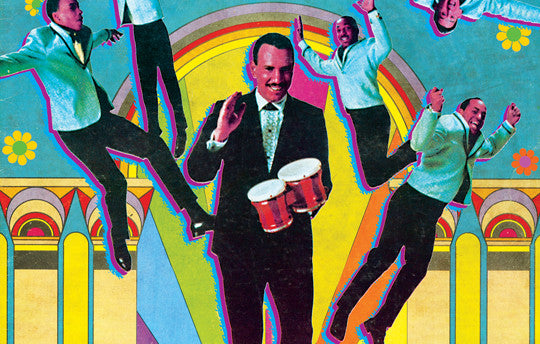Your Cart is Empty

Monday 29 April sees the release of two new World Music Network albums;The Rough Guide to African Disco and The Rough Guide to Latin Psychadelia.
Both albums can be purchased as physical or digital download and are also available with a subscription to World Music Network.
 As the 1970s dawned, the all-glittering, all-dancing sounds of disco were reverberating right around the globe. Creative scenesters put their own spin on the disco sound, mashing together the rhythmic pulse of funk, soul, and Latin with African grooves; soukous, Afrobeat, township jive and more. Dig the far out sounds of Osibisa, Tony Allen, Mango Groove and Yvonne Chaka Chaka.
As the 1970s dawned, the all-glittering, all-dancing sounds of disco were reverberating right around the globe. Creative scenesters put their own spin on the disco sound, mashing together the rhythmic pulse of funk, soul, and Latin with African grooves; soukous, Afrobeat, township jive and more. Dig the far out sounds of Osibisa, Tony Allen, Mango Groove and Yvonne Chaka Chaka.
Disco done African style can mean a whole throng of divergent sounds and this Rough Guide serves you up a hand-picked platter of the continent’s most sensational party vibes old and new.
A strong South African contingent appears on the album. Yvonne Chaka Chaka’s sound on ‘Kwedini’ is firmly bubblegum – a strand of saccharine disco-pop that employs electronic keyboards, synthesizers and crazily catchy call-and-response vocals. The eleven-piece South African party band Mango Groove makes an appearance on the track ‘Tsa-oo’. Teaspoon & The Waves provide a gem of a track with ‘Oh Yeh Soweto’ – a disco-fied cover of the classic track ‘Going Back To My Roots’, by Detroit-based Motown maestro Lamont Dozier. Mahlathini and the Mahotella Queens are heard on the bright number ‘Kazet’, a rare disco flavoured track that encapsulates the band’s positive lively sound – a style they termed mgqashiyo – literally ‘to bounce’.
Pat Thomas is a highlife musician from Ghana who can be heard on the irresistible funky track ‘Yesu San Bra’. Legendary Cameroonian saxophonist and vibraphone player Manu Dibango is heard on the driving track ‘Yekey Tenge’. ‘A Brand New Wayo’ by Nigerian ensemble Mixed Grill is a thick, brassy number that bristles with cool. Identical twin duo The Lijadu Sisters are also heard on ‘Come On Home’.
Heading up the modern movers, Bibi Tanga’s music bridges the gap between France, where he now lives, and the suburbs of the Central African Republic, where he grew up. Sofrito producers Frankie Francis and DJ Simbad remix Victor Uwaifo’s classic sounds on ‘Ohue’.
The bonus disc is a one-off re-issue of Soul On Fire by Maloko. Hear the works of Wilson Pickett, Sam Cooke, Otis Redding and James Brown as they have never sounded before – soukous style!
 During the 1960s and 1970s in Latin America, revolution was in the air – youth subculture was breaking its bonds, minds were expanding and music was turning inside out. This Rough Guide features a lovingly re-mastered selection of classic cuts by Joe Cuba and Johnny Rivera alongside contemporary psychedelic pioneers Brownout and Ocote Soul Sounds.
During the 1960s and 1970s in Latin America, revolution was in the air – youth subculture was breaking its bonds, minds were expanding and music was turning inside out. This Rough Guide features a lovingly re-mastered selection of classic cuts by Joe Cuba and Johnny Rivera alongside contemporary psychedelic pioneers Brownout and Ocote Soul Sounds.
The 1960s and 1970s were eras of activist rebellion and trippy experimentation encapsulated by the sound of reverberating guitars and whirling shimmering percussion. The psychedelic influence in the Latin world ran deep and musicians across the region put their own spin on the sound.
Joe Cuba opens the album with ‘Psychedelic Baby’, a song combining topical humour with an infectious groove. Next up Bronx-born Puerto Rican vocalist and timbale player Johnny Rivera is heard on ‘Cloud Nine’, taken from his 1976 album Up, Up and Away. ‘Todos’ is contributed by Los Nombres, a band once described as ‘one part War, two parts Santana, a dash of Motown, immersed in a rich Puerto Rican stock’.
Other vintage cuts include a track from self-proclaimed ‘Indian rock’ band, Conjunto El Opio. Hailing from Peru their song ‘Piratas En El Titicaca’ is a slab of fuzz-funk and features a sax playing a traditional Andean huyano huancaíno melody. Wild Wind formed in the mid-1970s and combine acid funk-rock with more traditional Cuban music like the bolero and son montuno. Afrosound was a nod by Fuentes studio executives to the psychedelic guitar-based sounds coming out of Peru at the time. ‘Baila Mi Rumbita’ is a cover of Barcelona’s gypsy rumba sensation Los Amaya, done in the lysergically enhanced Afrosound style.
Psychedelia is still a creative force on many contemporary bands like Ocote Soul Sounds, a project begun by members of the trailblazing Afrobeat revival orchestra Antibalas and Chicano salsa/indie rockers Grupo Fantasma. ‘En El Temblor’ describes an earthquake and appeals to Afro-Cuban orisha deities for salvation. Another modern outfit, Brownout encapsulate the revolutionary hippie-era in a modern Mexican-American context.
Los Destellos, the foremost Peruvian tropical band of the 1960s-1970s provide a full-length bonus album.